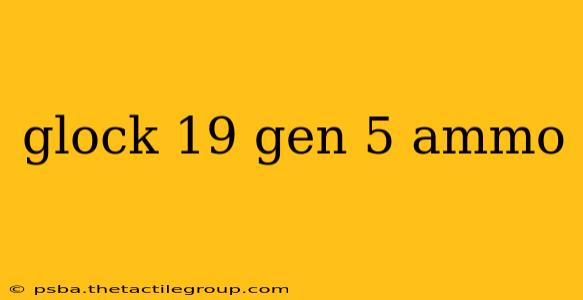The Glock 19 Gen 5 has quickly become a favorite among both law enforcement and civilian shooters, known for its reliability and versatility. But the firearm is only as good as the ammunition you feed it. Choosing the right ammo is crucial for optimal performance, safety, and accuracy. This guide delves into the various types of Glock 19 Gen 5 ammo, helping you make informed decisions for your shooting needs.
Understanding Glock 19 Gen 5 Ammunition
The Glock 19 Gen 5, like all Glocks, is chambered in 9x19mm Parabellum (9mm Luger). This widely available caliber offers a vast selection of ammunition types, each suited for different applications. Let's explore the key categories:
1. Full Metal Jacket (FMJ) Ammo
- Characteristics: FMJ rounds feature a lead core fully encased in a metal jacket, usually copper-plated. This design provides consistent performance and is relatively inexpensive. They're often chosen for target practice due to their cost-effectiveness.
- Applications: Target shooting, training, and some self-defense situations (though others might be preferred).
- Considerations: FMJ rounds tend to overpenetrate, making them less suitable for home defense where collateral damage is a serious concern.
2. Hollow Point (HP) Ammo
- Characteristics: Hollow point rounds have a cavity in the bullet's tip, designed to expand upon impact, increasing stopping power and reducing overpenetration. Various HP designs exist, each with varying expansion characteristics. Examples include Jacketed Hollow Point (JHP), and others with unique features designed for expansion.
- Applications: Self-defense, law enforcement, and personal protection.
- Considerations: While offering increased stopping power, HP ammunition can be more expensive and its performance can be affected by factors like velocity and the target's material.
3. +P and +P+ Ammo
- Characteristics: "+P" and "+P+" designations indicate ammunition loaded to higher pressures than standard 9mm. This results in increased velocity and energy. "+P+" represents an even higher pressure loading.
- Applications: These are generally used in self-defense situations where maximum stopping power is needed. It is imperative to verify that your Glock 19 Gen 5 is rated for +P/+P+ ammunition before using them.
- Considerations: Using +P/+P+ ammunition in a firearm not rated for it can cause damage to the gun and lead to serious injury. Always check your firearm's manual.
4. Training Ammunition
- Characteristics: This category includes rounds designed specifically for training purposes. This can include reduced recoil loads, or even inert rounds for dry-fire practice.
- Applications: Improving marksmanship skills, practicing drills, and familiarizing oneself with the firearm's operation without live fire.
- Considerations: Always follow safe gun handling practices even when using training ammunition.
Choosing the Right Glock 19 Gen 5 Ammo for Your Needs
The best ammunition for your Glock 19 Gen 5 depends on your intended use:
- Target practice: FMJ ammunition offers the best balance of cost-effectiveness and consistent performance.
- Self-defense: High-quality hollow point ammunition is preferred for its superior stopping power and reduced overpenetration. Consider researching various HP designs to find what performs best in your firearm.
- Law enforcement: The specific requirements for law enforcement ammunition vary by agency, but often prioritize reliable expansion and consistent performance in a variety of conditions.
Important Note: Always consult your firearm's owner's manual before using any ammunition. Improper ammunition can damage your firearm and cause serious injury. Never use ammunition that exceeds the firearm's pressure rating.
Responsible Gun Ownership
Selecting the correct ammunition is only one aspect of responsible gun ownership. Regular cleaning, proper storage, and continuous training are equally crucial. Remember to always practice safe gun handling techniques and store your firearm securely when not in use. This information is for educational purposes only and does not constitute professional advice. Always consult with a qualified firearms instructor or expert for personalized guidance.

